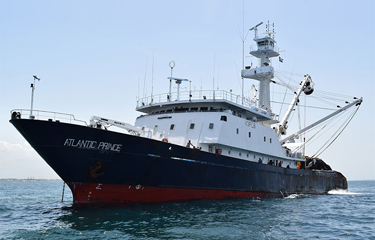One of China’s big distant water players has received USD 3 million (EUR 2.67 million) in compensation for a tuna reefer damaged in the Pacific late last year.
Shandong Zhonglu Oceanic Fisheries Co. has gotten the pay-out from the Qingdao office of China People Insurance Co., as well as USD 118,672 (EUR 105,618) from the China Fishing Vessels Mutual Insurance Association, as compensation for a fire that damaged its fishing vessel, the Seamark, while it was fishing 160 miles from Iwo Jima island last December.
The 125-meter vessel, which was carrying tuna, was registered to a Panamanian subsidiary of Zhonglu, but had flown under both the Liberian and Panamanian flag over the past decade. The Seamark was built in Japan in 1984 and has been registered to Zhonglu subsidiaries in both Panama and Las Palmas, Spain – proof of the international reach of Chinese distant-water fishing firms.
The use of reefers, transshipments, and international flags and subsidiaries also casts doubt on China’s official data for its overseas catch. China claims its distant-water fleet caught 2.17 million tons in 2019, down 3.87 percent year-on-year, according to China’s Ministry of Agriculture. China counted more than 2,600 distant water vessels in 2018 operating under its flag (the figure doesn’t count Chinese-owned vessels operating under other flags), with a catch of 2.27 million tons, an increase of 8.21 percent year-on-year.
State-controlled Zhonglu operates tuna seine vessels from Tema port in Ghana and claims to be China’s first distant-water operator to launch vessels targeting the Atlantic tuna fishery. Ghana-based Zhonglu subsidiary Yaw Addo Fisheries Co. is one of several China’s fishing firms in Ghana operating vessels under the Chinese and the Ghanaian flags.
As China’s has confronted depleted stocks in its own waters, its government has offered subsidies and policy support for its distant-water fishing companies. The latest of these supports is a new satellite system developed by China, intended to improve its fleet’s fishing efficiency and capacity.
The new ‘Beidou-3’ navigation satellite launched recently, moving China away from reliance on the U.S. global positioning system (GPS), according to a Chinese Central TV news special broadcast from Fenghua port, in the seafood processing and port city of Ningbo.
“Beidou will assist development of ocean fisheries,” according to a statement from Ningbo Hai Shang Xin Yi Science & Technology Co., which provides an “at sea wi-fi” service to the 714 vessels from Ningbo classed as distant-water trawlers – 90 percent of which use drag-nets, which have a much higher rate of bycatch than other modes of fishing.
Photo courtesy of Shandong Zhonglu Oceanic Fisheries Co.







